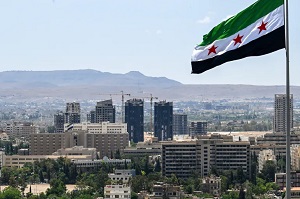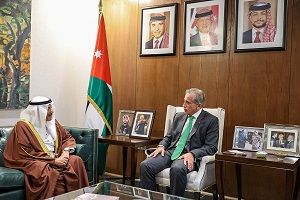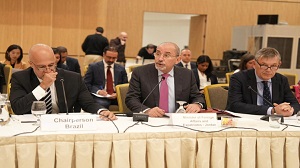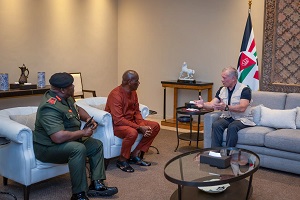Jordan deepens coordination with Syria as southern pressures grow
AFP
AMMAN — As Jordan has been notably intensifying its coordination with Syria, especially with tensions still rising in the northern neighbor’s south and drug-smuggling attempts continuing along the border, experts have urged firm security actions supported by sustained political engagement.
Since the downfall of the Assad regime on December 8, 2024, Jordan has been increasing its coordination with Syria but Jordanian officials have said that bringing the Amman-Damascus relations to pre-2011 levels requires that Syria’s state institutions and major infrastructure be restored – a thing which Jordan has been helping since the beginning of this year.
Several high-ranking Syrian delegations have visited Amman recently with the two sides launching intensified cooperation in water, energy, aviation, trade, among others.
The two countries have for the first time since decades began joint coordination towards resolving the long-standing water issue over shares in the Yarmouk River.
Sweida clashes
With armed clashes erupting between Druze groups and local Bedouin tribes in Syria’s Sweida, leaving hundreds of people dead, Jordan has played a key role in restoring calm in the southern Druze-majority province.
In September, Jordan, Syria and the US agreed on a roadmap they will implement collectively to end the crisis in Sweida and stablise southern Syria.
The roadmap was signed in Damascus, following a meeting that brought together Deputy Prime Minister and Minister of Foreign Affairs Ayman Safadi, Syria’s Foreign Minister Asaad Al Shaibani, and the US Ambassador to Turkey and Special Envoy for Syria Thomas Barrack.
The plan underlined that the stability, security, and prosperity of Syria are key to regional stability, adding that Amman, Damascus and Washington will work together to help Syria build a future of peace and prosperity for all its people.
The three countries affirmed commitment to support efforts aimed at rebuilding Syria on the basis that guarantees its security, stability, unity, and sovereignty, while fulfilling the aspirations its people.
Jordan, which has dispatched humanitarian aid convoys to Sweida, has also hosted Al Shaibani and Barrack for another follow-up meeting in Amman.
An unnamed official source has recently told the Jordan News Agency, Petra, that a delegation from Syria’s Sweida province may visit Amman as part of the roadmap agreed by Jordan, Syria and the United States but no date has been set so far.
The planned visit aims to open channels with local communities in Sweida, a province whose social and political shifts have shaped the southern landscape over the past year, according to officials, who said that engagement with the Druze-majority province is essential, as developments there directly influence stability along the Jordanian border.
A senior Jordanian official, who requested anonymity, has told The Jordan Times, that protecting minorities in Syria, including Christians and Druze, is a major priority for Jordan and a demand that Amman has conveyed for Damascus.
Drug smuggling
Security concerns remain central to Jordan’s approach on Syria.
Jordan has long suffered from illicit drug smuggling on its northeastern frontier with Syria, which stretches to around 400 kilometres.
With Syria emerging as a narco-state under Assad regime and a significant hub for the production and trafficking of captagon, Jordan had to deal with hundreds of attempts to smuggle drug into the Kingdom.
But Damascus new rulers have pledged to combat drug trafficking and have announced foiling attempts and dismantling smuggling networks at home.
The Jordanian and Syrian anti-narcotics departments have announced, in a joint statement, the results of their coordinated efforts to combat drug trafficking and smuggling.
The statement emphasised that, under the framework of bilateral security cooperation and with a shared commitment to protecting communities from the dangers of narcotics, the two agencies maintained close field cooperation and intelligence sharing, achieving significant results in recent months.
The two countries have announced that specialised teams successfully thwarted seven smuggling attempts across the shared border, seizing nearly one million narcotic pills destined for illegal distribution in the region, the statement said.
The cooperation also led to the dismantling of organised criminal networks involved in regional drug trafficking, which posed a direct threat to the security of both countries and neighbouring states.
Security experts have warned that the environment remains volatile in Syria.
Analyst Amer Sabaileh told The Jordan Times that southern Syria “already hosts active terrorist and criminal groups,” adding that Jordan must stay alert because instability could increase arms smuggling or expand confrontations near the border.
However, a high-ranking Jordan official has said that, while Jordan is still concerned about drug smuggling from Syria, the situation in southern Syria is better now because “drug trafficking and production there is no longer state-sponsored.”
Security dimension
Political analysts say the security dimension is tied to a broader political track.
Political analyst Abdel Hakim Qralla told The Jordan Times that southern Syria “is directly linked to Jordan’s national security, and any instability there affects the Kingdom at once”.
He said the trilateral coordination between Jordan, Syria and the US aims to prevent escalation and protect Syria’s unity. He added that a stable and unified Syria reduces risks that could spill across the border.
Regional dynamics add further complexity.
Analyst Thamer Anasweh said the understandings reached so far “give Jordan and Syria a base they can build on”.
He said Jordan “has already progressed on this track”, but any long-term arrangements must consider broader regional dynamics. He added that with the easing of the Caesar Act, Syria “now has a chance to regain internal balance and reorganise state institutions”.
Following a meeting earlier this month at the White House between US President Donald Trump and Syrian President Ahmed Al Sharaa at the White House, senior administration officials confirmed that the US Treasury Department, along with the departments of state and commerce, will announce new measures to lift economic restrictions on Syria.
Despite ongoing challenges facing Syria, observers said that coordinated steps remain essential to restoring stability in the south. They stressed that political dialogue, community engagement and border enforcement must move together.
According to political analysts, Jordan’s approach on Syria blends firm security action with steady diplomacy. The aim is to safeguard national stability while supporting a calmer and more predictable regional environment.




